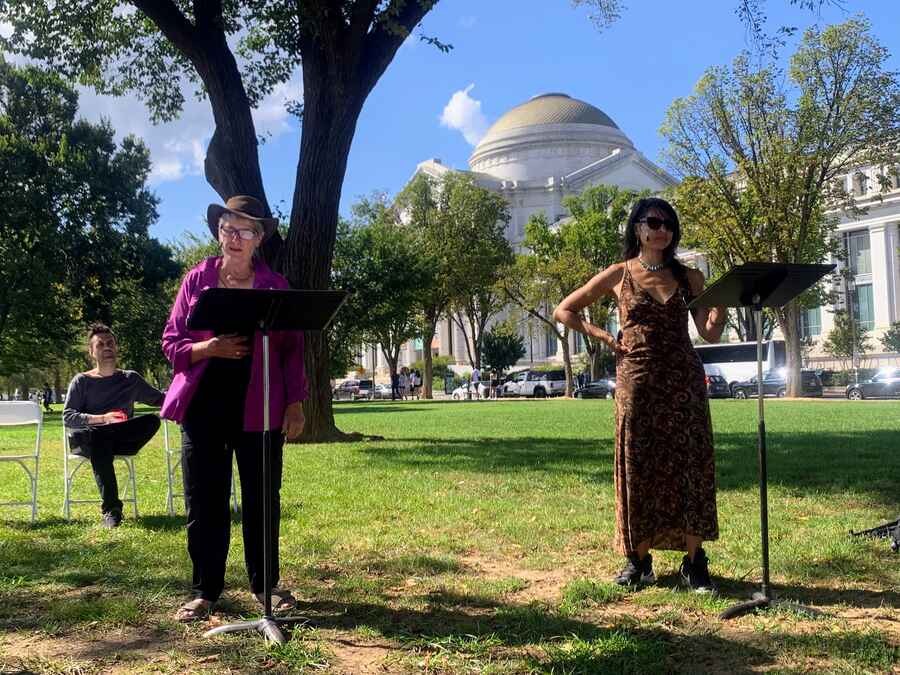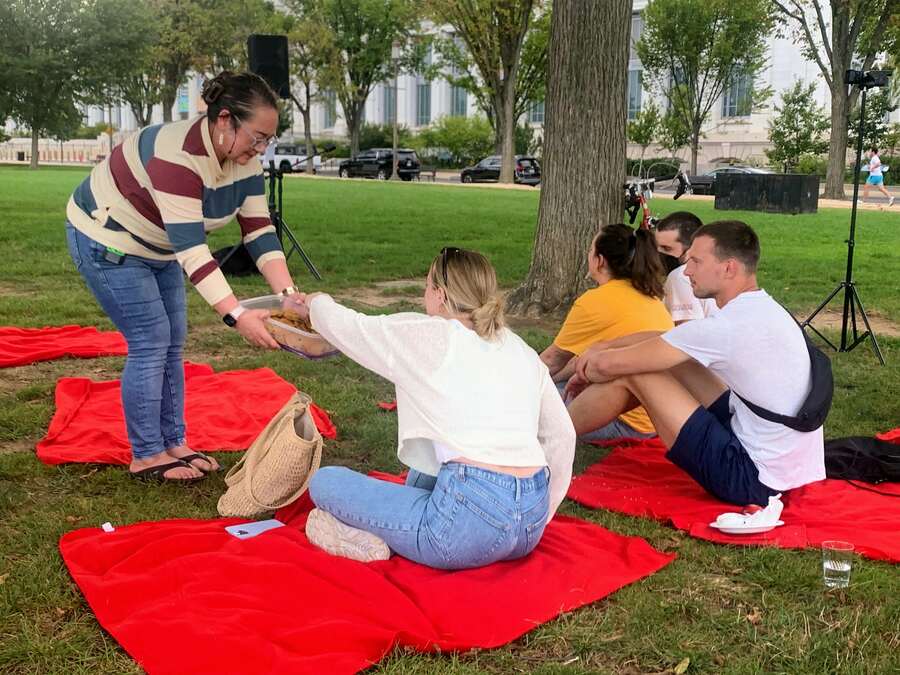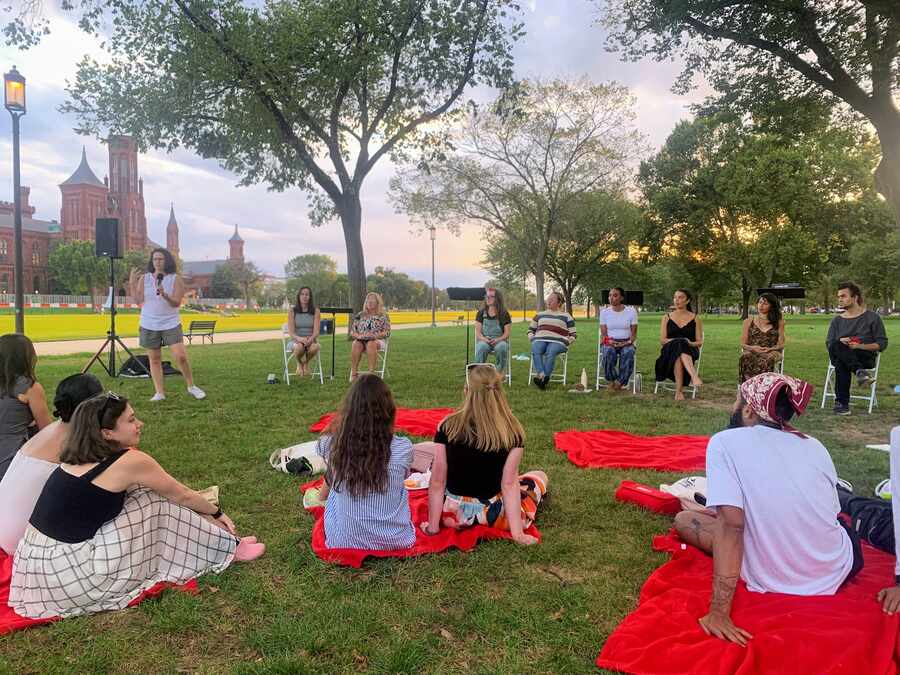“And, you know, sometimes she stands like this…”
Ashley Olive Teague, artistic director of Notch Theatre Company, demonstrated by standing on one foot with the inside of her other foot resting on the inside of her leg in the tree position. We were in the basement of an Airbnb in Washington, D.C., and Teague was giving Lisette Gabrielle character notes on Liz, a dancer-turned-environmental activist and mother of four Gabrielle was playing in a staged reading of Gwen Kingston’s 2021 play Wild Home: Ohio River Valley. “And when she’s yelling at her kids,” Teague continued, “she’s not, like, mad at them—she’s just keeping 100 balls rolling at a time because her brain operates on that level.”
Meanwhile, at a table a few steps away, sat Lois Bower-Bjornson—the real-life organizer for Clean Air Council on whom the character of Liz is very closely based—sending emails to schedule meetings with policymakers between this rehearsal and the show tomorrow night. Before the read-through started, she had announced proudly that she landed a meeting with Senator Sanders’s staff; now she threatened to crawl under the table from embarrassment at seeing herself portrayed.
Also present: activist-performers from Colorado, Alaska, and Pennsylvania; professional actors from New York, D.C., and Rhode Island; a local production team; and a couple of very cute babies. This was Wild Home: An American Odyssey, and everyone was there to stop the fossil fuel industry from robbing America of its future.
Wild Home is a unique theatrical venture, traveling across the country to partner with rural communities in creating community-responsive art that documents the experience of living next door to fossil fuel infrastructure. So far the project has produced work in Colorado’s North Fork Valley, Alaska’s North Slope, and the Appalachian regions of Ohio, West Virginia, and Pennsylvania. For a special gathering Sept. 10-15, collaborators from each of those locations came together for the first time to bring their stories to the nation’s capital—where fossil fuel policy gets made, though its immediate impacts are rarely felt there.
“Community-responsive performance” is a term unique to Notch Theatre Company. As a form that builds on several methodologies of the socially engaged, applied theatre tradition, it is ideally suited to fighting fossil fuel interests, because, when that industry comes to town, it specifically sets out to destroy local communities and take away their ability to respond. Wild Home: Ohio River Valley, tells the story of communities living in North and North-Central Appalachia, one of the most heavily fracked regions of the United States. The play takes place along two parallel timelines: One, set 100 years ago, follows a group of coal miners as they prepare to fight for their right to unionize. The other, set in the present and based on the real lives of community members, follows the story of Kris and Danielle, who want nothing to do with oil or gas, but who, because all of their neighbors signed leases to allow fracking on their properties, find that the oil company plans to drill beneath their land without their consent. Professional actors read the parts with the most lines, while community activists like Bower-Bjornson filled the other roles.
The play illustrates the ways this extractive industry tears communities apart, sickening and killing residents while turning neighbors against one another. Kris, a healthcare worker, exclaims, “They use about 10 different toxic chemicals in fracking and all of them can cause cancer.”

At the talkback following Wednesday’s staged reading on the National Mall, the activist-performers from Pennsylvania and Alaska detailed the cancer epidemics in their communities. Bower-Bjornson’s children go to school 20 minutes from the train derailment in East Palestine, Ohio, and one of the chemicals that train was carrying was vinyl chloride, a known carcinogen produced with ethane sourced from fracking. Janice Blanock, who read the role of Vicki, a character based on one of her Washington County neighbors, lost her teenage son to Ewing sarcoma, a rare bone cancer that has been diagnosed in three children in her small community in the last few years. Her advocacy prompted the commission of a study that determined that children living near fracking infrastructure have increased risk of developing cancer, and all residents have increased risk of asthma and low birth weight. Sara Siqiñiq Thomas of Sovereign Iñupiat for a Living Arctic (SILA) described the high rates of rare cancers and disease among young people in Alaska’s North Slope, where oil drilling contaminates the water sources of the wildlife that her community eats to survive.
But, as Jim—read by Bower-Bjornson—explains in the show, “If you stand up to the oil companies, they try to make it seem like you’re against progress, you’re against jobs.” Indeed, this unfathomably wealthy industry promises economic development and has money to throw around small communities, sponsoring things like high school football stadiums to build good will. When activists speak out about health and climate impacts, the industry paints them as radical outsiders, sowing division among neighbors.
In Alaska, Wild Home partnered to help create Sovereignty Stories, a series of recorded performances including two songs, a puppet film, and an oral short story, none of which even explicitly mention extractive industry. Nonetheless, at one screening of the works, Thomas reported that some members of the community were telling others not to attend, claiming that the artists were “trying to shut down the economy.”
When people do try to speak up and resist, the industry uses its overwhelming power to silence that response, draining their energy and resources. Its representatives use intentionally inscrutable technical and legal jargon to make it excruciating for a layperson to understand, like the notice they send to Kris in the play:
…if the tracts are of insufficient size or shape…unable to form an agreement as provided in section 1509.26 on a just and equitable basis…may make application to the division of oil and gas resources management for a mandatory pooling order.
The industry schedules public hearings at times when they know community members can’t attend—for instance, when many people from Alaska’s North Slope are out at sea—and blatantly ignores dissent when it does arise. It submerges community members in legal proceedings that drag on for decades, and hires community members’ lawyers out from under them, as happened to one of Bower-Bjornson’s neighbors. As Violet, an 84-year-old landowner fighting fracking on her land, read by Colorado activist Elaine Brett, puts it, “I spent thousands on lawyers. They did nothing.” At the talkback, Thomas described how it sometimes “seems like it’s too big to fight back against.”

Into this climate of divisiveness and silencing, Wild Home brings a mechanism for creating new communities of support and new methods of speaking out, as theatre can be uniquely positioned to do. In one moment of despair, Kris laments, “We don’t have a big group of people,” and Liz responds, “Well, that’s where you start—by finding your people.” At the talkback, Blanock referenced that line from the play and gestured to the cast of artists and activists from all over the country: “These people here today are my people now.”
More than the works themselves, the process of creating and sharing plays, songs, and stories knits people together on multiple levels. Locally, the process starts with listening. Teague and local collaborators tour the Wild Home communities to hear the stories of what brought people to the land, what keeps them there, and how the industry has impacted them. From those stories emerge works that paint a more complicated picture of rural life than the one-dimensional narratives with which city dwellers may be familiar.. In sharing those works at staged readings and screenings, the project facilitates talkbacks that help connect audience members to organizers, and help the communities connect the dots between their experiences.
Now that community has expanded to the national scale. At the talkback on Wednesday, one audience member described how the play reminded him of something happening in South Carolina. Another asked a question about how the companies can access private property without permission, and Brett explained the connection between the legal loopholes the industry uses in Appalachia and in the West. Between rehearsals and performances, cast members went to the Hill to share their stories and attended demonstrations for Indigenous rights. Thomas was invited to speak in opposition to the Willow Project, a proposed oil development project in Alaska, the morning after the show. Wild Home blurs the boundaries between art and “real life,” showing that what happens in performance can be both inspired by, and ripple out to, the wider community.
Not only is Wild Home creating a scalable community of activists, it is also making activism more fun, and therefore more sustainable. As Thomas told me, sitting through governmental and corporate meetings and hearings to resist dangerous policies can be extremely boring—one factor that powerfully contributes to activist burnout. Making art and telling stories, on the other hand, is fun and regenerative. In the play, Danielle discovers a litany of statistics about fracking’s human health consequences; Kris interrupts her recitation, “Statistics are just numbers. They take the person out of it. This is personal to me.”
For Thomas, Wild Home illustrates the “importance of the arts for opening people’s eyes” to “the human element” of these issues. The climate and ecological crises are hard to respond to and think about because they are occurring on so many scales, and exploitation is built into so many processes of everyday life. The community-responsive model makes it possible to see and hear the people living on the front lines of the fight for a more just and sustainable future—and in that specificity, to see the steps we all can take to join the work.
Abby Schroering, Ph.D. (she/her) is a theatre and performance scholar based in New York. Her forthcoming book, Theatres of Compost: Performance and Ecology for the Anthropocene, shows how performance is an ecological force with the capacity to deconstruct exploitative social processes and plant the seeds of a brighter, greener future.


